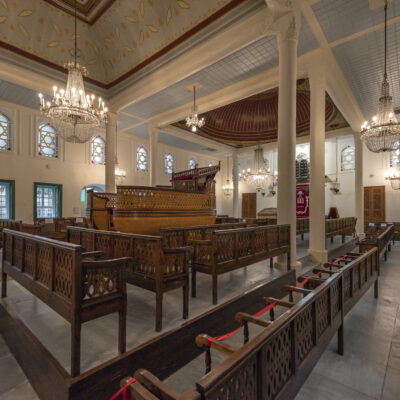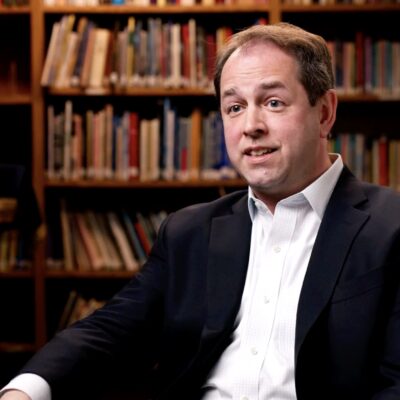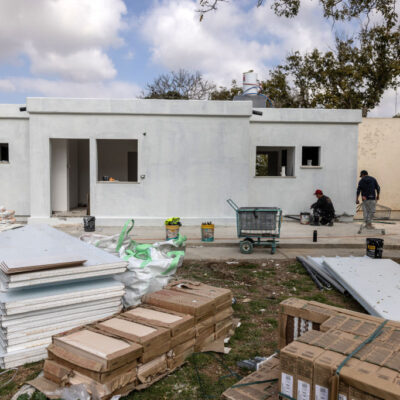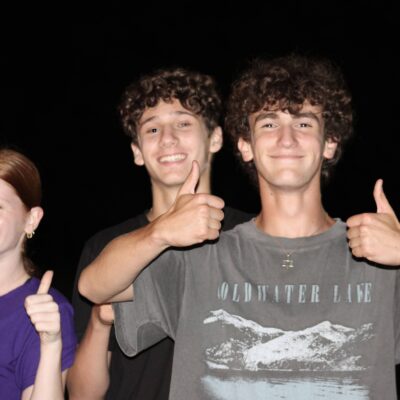Representatives from Israeli nonprofits flock to U.S. for large gatherings, ahead of end-of-year giving
The Israelis are coming! Representatives from numerous Israeli nonprofits are flocking to the United States this month to raise money, deepen relationships with new and existing donors, brainstorm ideas with American counterparts and show solidarity with American Jews amid rising antisemitism.
For many, the immediate impetus for their trip was this week’s Jewish Federations of North America General Assembly in Washington, D.C., which ended on Tuesday, or the Jewish National Fund-USA Global Conference for Israel in Dallas, which runs from Thursday to Sunday — both of which offer a chance for Israeli organizations to meet with large numbers of donors in one concentrated space. This period also marks the time when donors are considering their end-of-year giving.
The visiting Israelis represent a wide range of organizations and causes, from Jewish peoplehood groups, such as the Jewish Agency for Israel; Israeli civil society organizations; members of northern and southern Israeli communities that are rebuilding following the Oct. 7 terror attacks and the past year of war; and religious figures, such as former Ashkenazi Chief Rabbi David Lau and Israel’s chief rabbi of the Western Wall and Holy Places, Shmuel Rabinovitch.
For those attending the JFNA or JNF-USA gatherings, those often serve as a springboard for further travels around the United States to meet supporters, stakeholders and partners.
“Fundraising is not the main purpose for participating in the General Assembly for us. Rather it is very important for our new CEO to meet with CEOs of different federations to see how we can build strong relationships,” said Yossi Argov, chief of staff of Masa Israel Journey, who traveled to the JFNA General Assembly with new Masa CEO Meir Holtz. “We have some good partnerships with federations such as in Atlanta and Cleveland, but the idea is to strengthen the relationship with other federations.”
Holtz told eJP he hopes to use the conference as a way to brainstorm with U.S. Jewish organizations about new ways to collaborate “for the benefit of the Jewish people.”
“This conference is an invaluable opportunity to bring together all the organizations and individuals working tirelessly for the Jewish people everywhere and for the State of Israel, and to find new ways to collaborate,” Holtz said.
The General Assembly also provides the opportunity to meet for the first time with many of the new partners and donors who began supporting them since Oct. 7, according to Ortal Margalith, director of development at American Friends of Latet, which raises money for the Israeli food security nonprofit. (A recent survey found that 37% of Jewish organizations have brought on new donors since last October.)
“This is a great opportunity for so many like-minded people to come together,” Margalith said. “Since October there’s [been] such a big wave of support from the U.S. for Israel, including from many people who haven’t supported Israel before, at least not to that extent.”
Margalith added that her organization, one of Israel’s largest food security nonprofits, is not as well known abroad, and attending the JFNA General Assembly offered her a chance to spread the word.
“When you think about a war and who to support, people think of the few large organizations… which are doing an amazing job. But it’s also important to remember that there… are other causes that are not less important. So it’s really important to be able to connect with people who care about our mission, to explain about Latet, about what we’re doing,” she said.
For the first time this year, Tzedek Centers, a national grassroots movement of local activist communities that promote democracy, equality and solidarity in Israel, sent a delegation of three people to the JFNA General Assembly: Bar Kolodony, the organization’s partnership director; Lev Littman, its co-executive director; and Gil Amit, president of Tzedek Centers’ partner Mefalsei Nativ (“Paving Pathways” in Hebrew) and co-CEO of the Hashomer Hatzair Life Movement, which guides and supports alumni of the Hashomer Hatzair youth movement.
Kolodony noted that while the General Assembly provided a good opportunity for them to meet with their supporters from the Jewish Federation of Greater Kansas City and potentially expand their donor base through meetings with the Jewish federations of Baltimore, Minneapolis and Atlanta, she also sees the conference and subsequent meetings as learning opportunities.
“Funding is always something that’s needed, but I think there’s also a lot to be learned from these federations and from developing partnerships. There are always opportunities to learn from each other’s experiences, and this is a time when we need to be learning as much as we can,” Kolodony said. “Also, as much as American Jewry has been there for us, I think it is also important for us to be there for them with what they are facing and going through.”
One of things they will be doing, she said, is to try to understand where project and funding priorities are moving and what work that Tzedek Centers is already undertaking will fit with those dynamics and where there are opportunities for growth.
“It’s hard to sometimes understand what’s happening in the U.S. from this distance [in Israel]. So it’ll be a really good opportunity to see it in person, to have a better understanding,” she said.
Following the General Assembly, they also have several meetings and events scheduled, including a meeting with UJA-Federation of New York, which was supportive for their overall emergency work following the Oct. 7 terror attacks and have been supportive of their Protecting Arab-Jewish Partnership shared society project, Kolodony said. They also have speaking engagements planned at North American synagogues, including at the Reform Central Synagogue congregation in New York, in which they intend to bring a much-needed sense of optimism.
“The biggest message that we’re focused on is really about hope and building,” she said. “I think sometimes we get into these cycles and we’re sucked into this sort of depressing place. And it is a very depressing place to be in. We’re in a terrible situation. We have hostages still in Gaza. People have been killed all over. It’s devastating. In Majd al-Krum, where we just opened a new center, two young people were killed. It’s scary and devastating, but we’re really focusing on building hope and looking at what are the things that we can do, being proactive in it and supporting all of our centers, all the different communities that create this sort of vibrant network.”
Sally Poolat, the director for the Southeastern United States for the food security nonprofit Leket, is attending the General Assembly with Deena Fiedler, vice president of overseas public relations and development. Poolat said that as Israel’s national food bank, Leket has seen a 22% increase in the need for their services since the start of the war. She said that while the General Assembly is an important venue to “get on people’s radar,” her visits to meet with supporters in Tennessee and Missouri following the General Assembly are no less important.
“I was specifically hired to build a bridge between Israel and our donor base, to have that personal touch with our donor base. It is amazing that there are thriving Jewish communities in places like Aiken, S.C., and Birmingham, Ala.,” she said. “In September I went to Aiken and to Augusta, Ga. Almost 99.8% of the Jews I met there were eager to help Israel. They wanted to know how they could help Israel, but didn’t know which organizations were legitimate; which organizations get the money to the people that need it the most,” she said.
Menucha Saitowitz, partnership officer at Desert Stars which empowers Bedouin youth through leadership and academic programs, is participating in the General Assembly with her colleagues, Ariel Viezle, the CEO of the organization, and Esraa Abo Mdegam, the counselor for the group’s women’s leadership initiative and a graduate of the program.
They will also be meeting with people from federations and synagogues, private donors and participating in events in Washington D.C., Chicago, New York and Boston following the General Assembly.
Saitowitz said since the Oct. 7 attacks — in which dozens of Bedouin Israelis were killed, in some cases while protecting Jewish Israelis — the perception of Bedouin society within Israeli society has shifted notably. Initially, there was a “newfound awareness” about Bedouin society, particularly regarding their contributions during the conflict, such as helping rescue efforts, she said. Many people began to recognize that Bedouins were also affected by the violence including being murdered and kidnapped and killed by rockets. This increased awareness has led to more opportunities for dialogue and education about Bedouin society, she said.
So while they will be nurturing their philanthropic relationships through meetings with established donors, they also hope to bring the narrative of Bedouin Israelis to new audiences which have been receptive to their mission.
“For a lot of people it’s become kind of a binary issue. Either you’re supporting Israel… or it’s the other direction and people are looking more towards Gaza and where can they help Arabs who are being harmed in areas outside of Israel.,” said Saitowitz. “ I think especially among liberal American Jews, they feel this insane divisiveness that’s happening both within America and also in this part of the world, and they’re very eager to hear stories that go against the wider narrative which shows that you can still see this very trusting Jewish-Arab partnership. People are very receptive to that because if you read the news, it’s so depressing. There are many amazing organizations that bring together Arab and Jewish society. I feel it offers hope that a lot of people are looking for right now.”

 Add EJP on Google
Add EJP on Google









